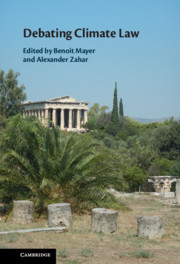Book contents
- Debating Climate Law
- Debating Climate Law
- Copyright page
- Contents
- Contributors
- Acknowledgements
- Abbreviations
- Introduction
- Debate 1: Customary Law
- Debate 2: The ILC’s Role
- Debate 3: CBDR Principle
- ~ A ~ In Defence of the Principle of Common but Differentiated Responsibilities and Respective Capabilities
- ~ B ~ The Notion of Common but Differentiated Responsibilities and Respective Capabilities: A Commendable but Failed Effort to Enhance Equity in Climate Law
- Debate 4: Compliance
- Debate 5: Climate Litigation
- Debate 6: Human Rights
- Debate 7: Historical Responsibility
- Debate 8: Climate Migration
- Debate 9: Negative-Emission Technologies
- Debate 10: Solar Radiation Management
- Debate 11: Climate Assessment
- Reflection 1: Adaptation
- Reflection 2: Loss and Damage
- Reflection 3: Disappearing States
- Reflection 4: Climate Finance
- Reflection 5: Non-State Actors
- Reflection 6: Regime Inconsistency
- Reflection 7: Aesthetics
- Conclusion
- Index
~ A ~ - In Defence of the Principle of Common but Differentiated Responsibilities and Respective Capabilities
from Debate 3: CBDR Principle
Published online by Cambridge University Press: 15 June 2021
- Debating Climate Law
- Debating Climate Law
- Copyright page
- Contents
- Contributors
- Acknowledgements
- Abbreviations
- Introduction
- Debate 1: Customary Law
- Debate 2: The ILC’s Role
- Debate 3: CBDR Principle
- ~ A ~ In Defence of the Principle of Common but Differentiated Responsibilities and Respective Capabilities
- ~ B ~ The Notion of Common but Differentiated Responsibilities and Respective Capabilities: A Commendable but Failed Effort to Enhance Equity in Climate Law
- Debate 4: Compliance
- Debate 5: Climate Litigation
- Debate 6: Human Rights
- Debate 7: Historical Responsibility
- Debate 8: Climate Migration
- Debate 9: Negative-Emission Technologies
- Debate 10: Solar Radiation Management
- Debate 11: Climate Assessment
- Reflection 1: Adaptation
- Reflection 2: Loss and Damage
- Reflection 3: Disappearing States
- Reflection 4: Climate Finance
- Reflection 5: Non-State Actors
- Reflection 6: Regime Inconsistency
- Reflection 7: Aesthetics
- Conclusion
- Index
Summary
This chapter debates the significance of the principle of common but differentiated responsibilities and respective capabilities in the light of different national circumstances (CBDR-RC+). A top-down determination of state responsibility based on an objective assessment, as in the case of the Kyoto Protocol, which created two main categories of states, has proved controversial, due to the existence of alternative theories of differentiation. All of them seem to have been mashed up together in CBDR-RC+. Thomas Leclerc develops the argument that the principle has now become legally meaningless, as it does no more than invite each state to determine its own contribution to climate action, entirely free from external review, which is something we hardly need a new principle for. But there is also the argument, articulated by Daria Shapovalova, that CBDR-RC+ remains central to the UNFCCC regime, and can influence the direction of the negotiations, as well as litigation outcomes.
Keywords
- Type
- Chapter
- Information
- Debating Climate Law , pp. 63 - 75Publisher: Cambridge University PressPrint publication year: 2021
- 3
- Cited by



